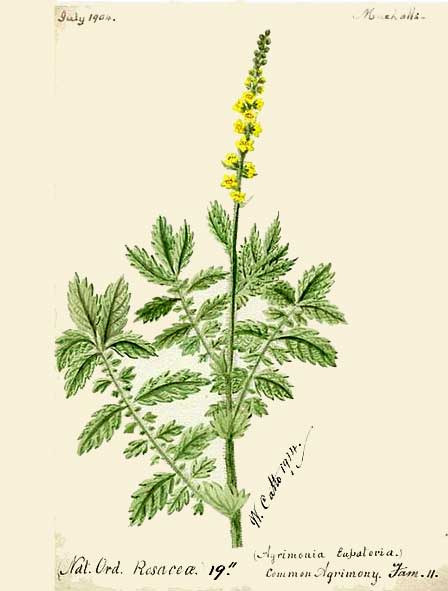Agrimony - a medicinal herb
Agrimony (Agrimonia eupatoria) stops wounds from bleeding after a cut, scrape, or injury.

Agrimony is considered an excellent liver tonic and is good for stopping diarrhea due to its astringent properties. This medicinal plant can also help ulcers to heal.

Agrimony is a healing herb.
Agrimony is also known as Cocklebur or Bur Marigold. It has the ability to stop bleeding when applied to shallow cuts and scratches.
This is good news for hikers, fishermen, and other people that are likely to get scratched or scrapped while enjoying the great outdoors.
Like the herb yarrow, agrimony also stop bleeding from razor nicks that you get from shaving. Use powdered leaf for best results.
Tired, achy feet from too much jogging? Try an agrimony tea foot soak. It feels amazing.
Agrimony is also anti-parasitic, antibacterial, and used for soothing damaged mucus membranes.
Agrimony contains tannins, flavonoids, polyphenols, terpenoids, minerals, volatile oils, and other constituents including luteolin, quercetin, potassium, vitamin C, vitamin K, and salicylic acid.
Agrimony has a high silica content and is good for the whole digestive system, especially the stomach.
It is sometimes used to treat tapeworm infestation and can be used as a douche for helping get rid of yeast infection.
As noted, the herb agrimony is astringent and helps reduce inflammation, which makes it an excellent natural remedy for inflamed mucus membranes.
Use agrimony tea in gargle form for mouth sores and gum disease. It can also be used on the genitalia without fear of burning.
Using agrimony tea as an eye wash
Aerial parts of the agrimony plant can be used in tea form as a soothing eye wash. Be sure to strain the liquid through a coffee filter or several layers of sterile cloth first, so that plant material doesn't get in the eye!
It is best to use the purest water you can find when making herbal washes.
Read more about making your own natural products at home.

Use agrimony to relieve stomach ache.
Agrimony is safe for children. Weak agrimony tea is good for most stomach problems including colic.
This herb may also help food allergies since it stimulates bile flow and gets things moving out of the stomach. Start with small doses and take more as needed.
Dried, organic agrimony can be purchased for less than $5 an ounce.
Agrimony has a long history in herbal medicine.
Agrimony was used in ancient times by soldiers to soak tired, aching feet after a long day of marching.
Agrimony was used centuries ago to treat muscle pain, eye infections, diarrhea, warts, wounds, snake bites, coughs, flu, and disorders of the gallbladder, liver, and kidneys.
Known as "the gunshot herb", agrimony was often to stop bleeding from battle wounds. Soldiers were known to look for agrimony along the roadside and pick it, keeping it in their pockets until needed.
Agrimony was also placed under the pillow to induce peaceful sleep.
The future of agrimony
Studies have shown that using agrimony extracts, along with silver nano particles, can inhibit tumor growth. This may help in the treatment of certain cancers.
Agrimony and Bach Flower Remedies
According to the Bach Centre, agrimony is good for anyone who hides their troubles under a mask of happiness.
"Agrimony helps us come to terms with the darker side of our lives and personalities, so that we can become more rounded human beings."
To learn more about agrimony and Bach Flower Remedies, visit their website.
Getting agrimony into the body
Agrimony is made into teas, tinctures, washes, sprays, gargles, and powders.
Agrimony tea has strong antioxidant properties that fight free radical damage inside our bodies' cells. Agrimony tea is especially good at fighting free radicals in the brain!
Studies show that agrimony tea can help improve neurological function. This is great news for dementia patients.
Read more about herbs for brain health.
The tea can also help reduce high cholesterol levels if consumed regularly.
Agrimony leaves are used in natural gargles for sore throat.
Roots are made into tinctures for treating diarrhea with natural medicines.
Agrimony compresses, creams, and lotions are used on eczema and other stubborn skin conditions. Apply at least twice a day for best results.
Agrimony ointment is used on the skin to speed healing.
The herb can also be added to herbal baths.
Growing agrimony plants
Agrimony has hooked seed pods that catch on clothing and animal fur. The bur-like seeds are very sticky and hard to remove from clothing.
Native to temperate regions of the northern hemisphere, the plant is a perennial that grows to heights from one to six feet tall.
It has sets of compound leaves that may smell like apricot when crushed.
A spike of tiny yellow flowers rises up on a hairy stalk in summer. Agrimony grows in any soil that isn't too wet or soggy and it prefers full sun.
Agrimony can be propagated by seeds or divisions, and is pollinated by insects.
Sometimes used in fragrances, agrimony is also used in dyes.
*Agrimony may cause sensitivity to the sun. Do not use it before going outdoors on a sunny day! Always consult with your healthcare professional before taking and herbs especially if you are pregnant, nursing, or taking other medications.
Sources:
https://www.ncbi.nlm.nih.gov/pmc/articles/PMC8603700/
https://www.ema.europa.eu/en/documents/herbal-summary/agrimony-summary-public_en.pdf
https://www.sciencedirect.com/science/article/pii/S102194981630028X
Blessings to you and yours!
Thanks so much for reading my blog. Jan.

*Note - the information on this website has not been evaluated by the Food and Drug Administration.
© 2005-2024 website design and content by Janice Boling